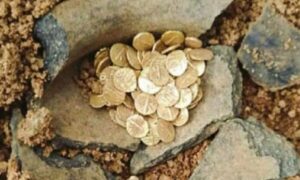“Unlocking the Future: How a Simple Discovery Revolutionized Technology and Changed Our Lives Forever”
On December 16, 1947, Brattain and Bardeen tested their new design for the first time. To their delight, it worked perfectly, exhibiting a 30 percent gain in power and voltage gain of 15% at a frequency of 1,000 Hertz. Carpooling home that night, Brattain exclaimed to his colleagues that they had just conducted the most important experiment of their lives and swore them to secrecy until Bell Labs officially announced their discovery. Bardeen, however, could not help sharing the news, telling his wife at dinner that “We discovered something today.” His wife, distracted by the couple’s children, reportedly replied: “That’s nice, dear.”
By contrast, William Shockley, on sabbatical in Europe at the time, was enraged to discover that not only had he not been directly involved in the team’s breakthrough – but that they had strayed so far from his original field-effect concept. It was a bitterness which was to prove surprisingly productive.
On June 30, 1948, Bell Labs officially announced Brattain and Bardeen’s discovery, which by now had acquired a new name: transistor. The term had been coined by fellow Bell engineer and part-time science fiction writer John Pierce as a contraction of “trans-resistor”. Unfortunately, however, the announcement of the transistor received little attention in either the popular or scientific press. Not only were there few apparent applications for the device, but it was fragile, temperamental, and difficult to manufacture. Furthermore, even its inventors didn’t understand exactly how it worked.
Meanwhile, Shockley, fuelled by jealousy and indignation, doggedly pursued his quest to one-up his colleagues. While attending a meeting of the Physical Society in Chicago in late 1947, he began filling his notebook with page after page of detailed notes describing a new type of transistor, consisting of one layer of P-type semiconductor sandwiched between two layers of N-type semiconductor. By January 23, 1948, Shockley had come up with a workable design, which worked similarly to a PN diode but with three terminals: the emitter, the collector, and the base. When a positive current was applied to the base, it disrupted the depletion region between the semiconductor layers by draining away excess electrons, allowing current to flow between the emitter and the collector. Bardeen and Brattain’s transistor worked in a similar fashion, only the currents travelled through a thin layer at the top of the germanium crystal. One month after Shockley perfected his theoretical design, Bell Labs filed four patents for semiconductor amplifiers – both Brattain and Bardeen’s original point contact design and Shockley’s bipolar junction or NPN transistor.
Though Shockley’s design was successfully demonstrated on April 2, 1950, the first commercial transistors, produced by Western Electric in 1951, were of the point-contact type. But while these saw limited use in long-distance telephone switching gear and military equipment, it soon became clear that the junction transistor was far more robust and easy to manufacture, and this became the standard design going forward.
Still, for several years the transistor remained a solution looking for a problem. It was not until 1952 that New York-based firm Sonotone introduced the lightweight transistorized hearing aid – the first consumer product to make use of the new technology. Two years later, researcher Gordon Teal at Texas Instruments figured out how to replace germanium – which was unreliable and sensitive to heat fluctuations – with silicon, producing an even more reliable and robust transistor. That same year, Texas Instruments and Industrial Development Engineering Associates unveiled a groundbreaking product: the Regency T-1, the world’s first portable, fully-transistorized radio. Though plagued by technical problems, the radio was an instant hit, selling over 150,000 units over its brief production run.
It is difficult to overstate the cultural impact of the TR-1 and its descendants. Previously, consumer radios were heavy, bulky devices restricted to the home living room. With transistor radios, however, consumers – particularly teenagers – could take their music wherever they wanted – an ability that profoundly shaped the development of youth culture.
The transistor also helped reshape the global economic landscape. As American manufacturers began increasingly focusing on Cold War military contracts, foreign entrepreneurs saw an opportunity to cash in on the emerging consumer electronics market. Among these were Japanese engineers Masaru Ibuka and Akio Morita, who in 1946 founded an electronics company called Tokyo Teletech. In 1958, the company changed its name to Sony. Soon, inexpensive Sony transistor radios and television sets began flooding the global market, establishing Japan as a global leader in consumer electronics and finally bringing the era of the vacuum tube to an end.
Meanwhile, the importance of Brattain, Bardeen, and Shockley’s discoveries were finally recognized when, in 1956, the trio shared the Nobel Prize in Physics for “…their researches on semiconductors and their discovery of the transistor effect.” But their elation was short-lived, for by then Shockley’s ruthless pursuit of sole credit for the invention of the transistor had broken the team apart. Shortly after receiving the Nobel Prize, Shockley moved to Palo Alto California and founded Shockley Semiconductor Laboratory, the first tech company in what would come to be known as Silicon Valley. But while Shockley’s clout initially attracted the best and brightest to his company, his difficult personality and tyrannical management style soon drove them away.


















